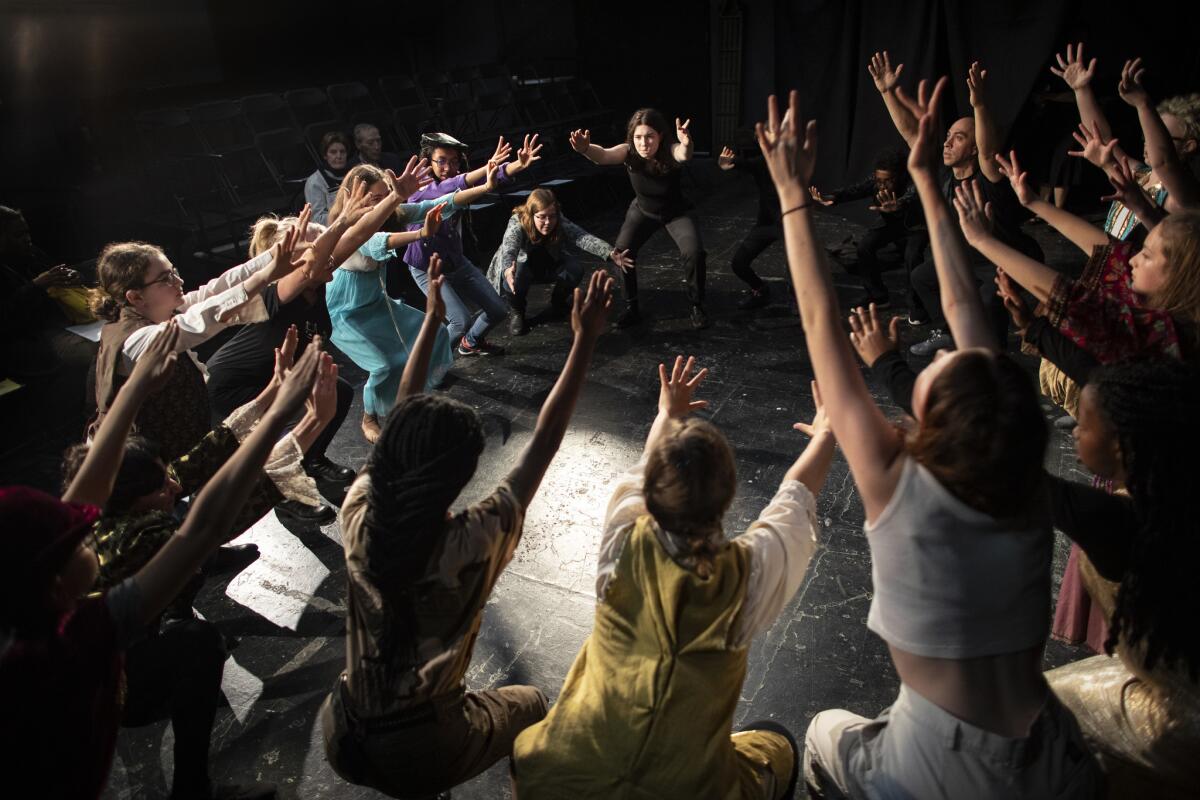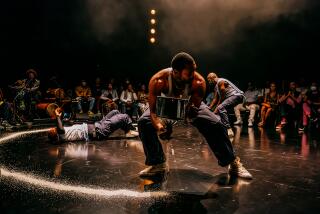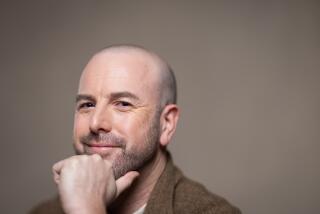Hooked on Shakespeare by age 6: The drama club where kids nerd out on the Bard

The Los Angeles Drama Club works with youth from 6 to 17 from a range of economic backgrounds, from the homeless to the kids of Hollywood showrunners. LADC’s mission is to expose youth to theater and cultivate safe spaces for self-expression.
It’s a Shakespeare production with an occasional interlude, a jingle performed to the tune of “Mary Had a Little Lamb.”
The nursery rhyme is what the Los Angeles Drama Club’s young theater students sing and dance to during set changes of their “cracked fairy tale version” of “Cymbeline” — the tale of a British king, a wicked queen, a liar and, naturally, star-crossed lovers.
As kids scurried in the background, moving tables and chairs offstage, a row of smiling girls, one clad in crown and beard, clapped out a beat while singing: “This is how we change a set, change a set, change a set ... in the middle of a play.”
Offstage they skipped. And onto the stage entered 13-year-old Oliver Cowan to deliver his lines (masterfully) as Posthumus Leonatus, Princess Imogen’s gullible, jealous and once-secret husband:
“Fear it not, sir; I would I were so sure / To win the king as I am bold her honour / Will remain hers.”
Every spring and fall since 2006, some 75 kids ages 6 to 17 from across Los Angeles bring to life the English playwright’s work for the Shakespeare Youth Festival. The performances are a culmination of weeks of rehearsals and part of the L.A. Drama Club’s mission to expose youth — from the homeless to the kids of Hollywood showrunners — to theater and cultivate safe spaces for self-expression. This year the spring schedule kicked off with “As You Like It” and will end Sunday with “Henry IV” at the Lyric Theatre.
Kids don’t have to audition to land roles. It’s how the organization ensures that every child has the chance to explore theater, be it through its school or summer programs. Once they do, many of them stick with it for years.
“Our teens, some of them have been working together for like seven or eight years,” said Julia Walker Wyson, the organization’s executive director. “And they are so bonded. They just love each other so much. … I think that’s part of what, in terms of making them better citizens of the world, they know that they have to work as a community and that the show is only as good as the community.”

For Velouria Rosalinda Perez, 14, who played the lost Prince Guiderius in “Cymbeline,” Shakespeare is familiar territory. She’s been performing his work since she was 9.
“It’s so much fun,” she said about reading and memorizing Shakespeare’s lines. When she joined, she was “a little confused as to what it meant,” but after going through lines one by one with teaching assistants, dissecting the language to uncover the stories within it, she got the hang of it. She catches the jokes now.
Theater has played a key role in her evolution, she said.
“I started very young, and I don’t think I was necessarily shy, but I was super quiet,” said Velouria, a ninth-grader from Eagle Rock Junior/Senior High School. “I had a stutter actually … and so I used to consider what I said a lot more.” Thanks to the drama club, she emerged, little by little, into herself. And her stutter has been banished.
“I started talking in a lower tone, which allowed me to be louder. And now I have a louder voice, and I think overall a larger personality,” Velouria said.
Thirteen-year-old twin brothers Daniel and Anthony Roberson, who played “everyone else” in “Cymbeline” (lords, storytellers, soldiers, senators, messengers, personal bodyguards, the king’s siblings), have been performing Shakespeare since they were 8.
But it took Daniel some time to come around to the four-centuries-old literature. At first, he didn’t like having to memorize lines. But he found a method that worked for him: “I pretty much just break it up into chunks, read it over and over again, pick the next chunk, read it over and over again.”

Though the brothers aren’t giving up acting any time soon, they have other career plans. Anthony wants to work with animals, and Daniel’s going to be a geologist. Wherever they go in life, one thing is certain. Thanks to Shakespeare, they’re more comfortable in their skin.
“Doing Shakespeare really got me a lot of confidence, so I wasn’t as shy at school and I raised my hand more,” Anthony said.
“It also got me better at public speaking,” said Daniel.
Besides the kids’ personal growth, what the L.A. Drama Club also fulfills is the human need to bond with others, co-founder and artistic director Blaire Baron said.
“I think it’s an emergency that children need to connect eye to eye, person to person in physical space before everyone goes down the vortex of cellphones and screens,” said Baron, a former Broadway actress. “It’s creating an epidemic of loneliness and depression. And I watch it. And I see the solution when we do the theater games.”
Baron and Wyson laugh about this, but they’re convinced even Congress and White House officials could benefit from Shakespeare and playing theater games like one called “happy, mad, sad,” in which students take turns acting out those emotions. Wyson calls it a “deceptively simple” but “really powerful” game.
“These are tools that leadership should be doing,” Baron said.
Better yet, they hope these young theater students carry their confidence, sense of community and public speaking skills into their adult lives and become the leaders of our future.
More to Read
The biggest entertainment stories
Get our big stories about Hollywood, film, television, music, arts, culture and more right in your inbox as soon as they publish.
You may occasionally receive promotional content from the Los Angeles Times.











